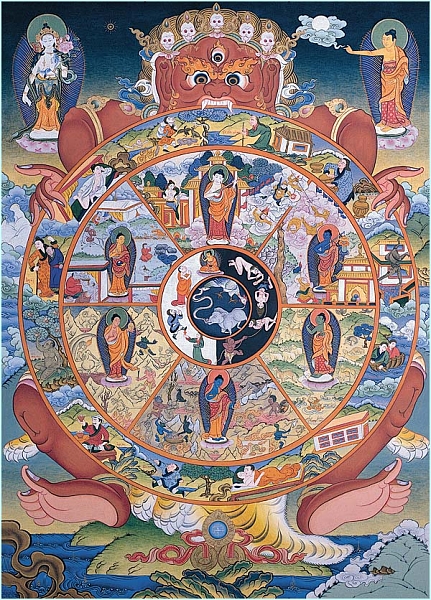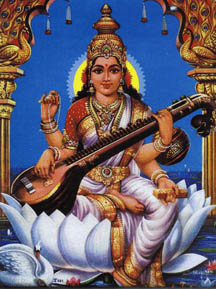Hindus believe in reincarnation - a belief that the soul is eternal and lives many lifetimes, in one body after another. The soul is sometimes born in a human body, sometimes in an animal body and sometimes in a plant body, etc.. Hindus believe that all forms of life contain a soul, and all souls have the chance to experience life in different forms.
The Hindu tradition perceives the existence of cyclical nature of the universe and everything within it. The cosmos follows one cycle within a framework of cycles. It may have been created and reach an end, but it represents only one turn in the perpetual "wheel of time", which revolves infinitely through successive cycles of creation and destruction. Within this cycle of creation and destruction of the universe, the soul (atman) also follows its own version of cycle called samsara, the cycle of rebirth in which individual souls are repeatedly reincarnated.
The Sanskrit word samsara means "the repeated passing of souls through different worlds- gross or subtle." Thus, samsara means going through the cycle of repeated births and deaths. Under the influence of karma, the soul moves upwards and downwards on the wheel of rebirth, the round of birth, death and rebirth undergone by all living beings. It is a cycle of transmigration from one living form into another.
The concept of samsara is first mentioned in the Brihadaranyaka Upanishad.
The belief in samsara is connected with the Hindu belief in karma. The law of karma states that just as every action has a cause, so actions have reactions that are impossible to escape. Karma is the cause of our particular destiny, the law of nature that ensures that we become what we think or do. Misfortunes in our present life are the result of acts that we have committed in the past. Suicide, according to the law of karma, is not therefore an option: karma cannot be escaped or deferred and its effects will only be worse if we try to avoid it.
When a caterpillar has come to the end of a blade of grass, it reaches out to another blade, and draws itself over to it. In the same way the soul, having coming to the end of one life, reaches out to another body, and draws itself over to it.
A goldsmith takes an old ornament. and fashions it into a new and more beautiful one. In the same way the soul. as it leaves one body, looks for a new body which is more beautiful.
The soul is divine. But through ignorance people often identify the soul with the mind, the senses and the emotions. Some people even identify the soul with the elements of earth, water, air. space and fire.
As people act, so they become. If their actions are good. they become good; if their actions are bad, they become bad. Good deeds purify those who perform them; bad deeds pollute those who perform them.
Thus we may say that we are what we desire. Our will springs from our desires; our actions spring from our will; and what we are, springs from our actions. We may conclude, therefore, that the state of our desires at the time of death determines our next life; we return to earth in order to satisfy those desires.
Brihadaranyaka Upanishad 4:4.3-6a
Our actions in our present lives determine our fate in the lives that follow, and consciousness itself is believed to be a karmic memory, contained by vijnana, the higher conscious mind, throughout the many incarnations of atman, the soul. Desire is the cause of karma, and it is because we still have desires to operate in the realm of action, to live normal lives in the world, that we are constantly reborn into the cycle of samsara, the endless chain of reincarnation.
Death is a key part of this cycle and is treated with specific importance. Death is the last samskara (cycle of life) referred to as the 'last sacrifice'.
The tree of eternity has its roots in the sky, and its branches reach down to earth. It is God; it is the immortal soul.
The whole universe comes from God; his energy burns like fire, and his power reverberates like thunder , in every part of the universe. In honor of God the sun shines, the clouds rain, and the winds blow. Death itself goes about its business in fear of God.
If you fail to see God in the present life, then after death you must take on another body; if you see God, then you will break free from the cycle of birth and death. God can be seen, like the reflection in a mirror, in a pure heart.
When the senses are calm and the mind is motionless, then your heart is pure; you have reached the highest state of consciousness, in which you are unified with God. If this state of consciousness is firm and secure, so it can never be bro- ken, then you are free.
To calm the senses and still the mind, you must abandon the self. You must renounce 'I' and 'me' and 'mine'. You must suppress every desire that surges around the heart. You must untie every knot of attachment.A hundred and one lights radiate from the heart. One of them shines upwards to the crown of the head. This points the way to immortality. Every other light points to death.
Katha Upanishad 6.1-5. 10-11, 13-16
The law of karma governs the universe and all beings within it; it acts impersonally and binds each individual soul (atman) to the world and in addition to the cycle of transmigration.
brahmanda bhramite kona bhagyavan jiva
guru-krsna-prasade paya bhakti-lata-bija
"According to their karma, all living entities are wandering
throughout the entire universe. Some of them are being elevated to the upper planetary systems, and some are going down into the lower planetary systems. Out of many millions of wandering living entities, one who is very fortunate gets an opportunity to associate with a bona fide spiritual master by the grace of Krishna. By the mercy of both Krishna and the spiritual master, such a person receives the seed of the creeper of devotional service."Caitanya Caritamrita Madhya 19.151
According to the Bhagavad Gita, the soul assumes bodies, or sheaths, as long as it still yearns to live and act. Only by completely renouncing action and the external illusion of the world can we be free of karma, and thus find moksha, or release from reincarnation.
However, Bhagavad Gita also teaches that our actions need not necessarily produce a negative karmic result if we act disinterestedly, so that we are unconcerned about the fruits or rewards of our deeds. Disciplined action is the way of truth (dharma) and the path to brahman (the godhead). By offering our every action, thought, and word to brahman, the ill effects of karma are nullified and the atman (the soul) is free of egotistical desire.
You cannot attain perfection by merely shirking action. Indeed it is impossible even for a moment to be utterly inactive. All living beings are driven to action by their own natures.
Those who withdraw from action, while allowing their minds to dwell on sensual pleasures, are deluding themselves; they can never follow the path to perfection.
Fulfill your duties; action is better than inaction. Indeed, you should strive to maintain the health and strength of your body. Yet selfish action will enslave you. Act selflessly, without any thought of personal gain.
When human beings were created, the obligation of selfless action was also created. God promised that through selfless action human beings would fulfill their deepest desires.
Good people, who share the fruits of their work, are freed from all their sins. But those who keep the fruits of their work for themselves, consume sin. Every selfless action is inspired by God; he is present in every good deed. All life turns on this truth.
Gita 10, 13-16
All worldly existence is subject to the cycle of samsara, which is thought of as having neither beginning nor end. According to Hinduism the goal of human life is to be free or liberated from repeated births and deaths. Such liberation is called moksha or mukti in Sanskrit. Moksha can be attained only through God-realization.
Moksha is the end of the death and rebirth cycle and is classed as the fourth and ultimate artha (goal). It is the transcendence of all arthas. It is achieved by overcoming ignorance and desires. It is a paradox in the sense that overcoming desires also includes overcoming the desire for moksha itself. It can be achieved both in this life and after death.
Hinduism teaches that the ultimate solution to life's basic problems is to be released from karma and gain freedom from this cycle of rebirth.
Consider those who in the course of many lives on earth have become free from desire. By this we mean that all their desires have found fulfillment within the soul itself. They do not die as others do. Since they understand God, they merge with God.
'When all the desires clinging to the heart fall away, the mortal becomes immortal. When all the knots of desire strangling the heart are loosened, liberation occurs.
As the snake discards its skin, leaving it lifeless on an anthill, so the soul free from desire discards the body, and unites with God who is eternal life and boundless light.




